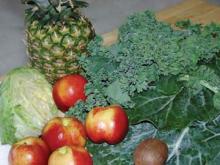A significant, nonlinear relationship exists between fruit and vegetable intake and colorectal cancer risk, based on a meta-analysis of prospective studies, reported Dagfinn Aune and his colleagues in the July issue of Gastroenterology.
Moreover, the greatest risk reduction occurs among patients in the lowest stratum of baseline consumption who subsequently raise their intake – a prime target for preventive public health initiatives, the authors said.
According to Mr. Aune, a researcher in the department of epidemiology and biostatistics at the Imperial College London, and his colleagues, the possible link between fruit and vegetable consumption and colorectal cancer risk has been the topic of numerous studies, although the findings have rarely been conclusive.
Indeed, two major meta-analyses from the World Cancer Research Fund/American Institute for Cancer Research, conducted 10 years apart, came to different conclusions.
The first, in 1997, found "convincing evidence" that vegetable intake, but not fruit intake, was associated with reduced rates of colon cancer. But the second analysis, in 2007, concluded there was "limited suggestive evidence for risk reduction by fruits and nonstarchy vegetables ... thus a downgrading of the judgment of the evidence compared with the previous report," wrote Mr. Aune and his associates.
In the present meta-analysis, Mr. Aune and his coauthors searched the PubMed database up until May 2010 for cohort studies of fruit and vegetable intake and colorectal cancer risk. To be included, studies had to have a prospective cohort, case-cohort, or nested case-control design.
First, the authors assessed the associations between colorectal cancer risk and the highest and lowest intakes of both fruits and vegetables. To accomplish this, they analyzed 11 of the included studies, comprising 11,853 cases of cancer among 1,523,860 participants.
They found that the summary relative risk (RR) for the highest intake, versus the lowest, was 0.92 (95% confidence interval, 0.86-0.99), a "small, but statistically significant reduction," the authors wrote (Gastroenterology 2011 July [doi:10.1053/j.gastro.2011.04.013]).
The finding was similar when they focused on fruit alone, an analysis that included 14 studies, 14,876 cases, and 1,558,147 participants. For highest versus lowest fruit intake, the relative risk for cancer was 0.90 (95% CI, 0.83-0.98). And for vegetables alone, the summary RR was 0.91 (95% CI, 0.86-0.96) across 16 studies with 16,057 cases and 1,694,236 participants. Next, the authors looked for a dose-response relationship in each of the three intake categories. For fruits and vegetables combined, the summary RR per 100 g/day was 0.99 (95% CI, 0.98-1.00).
For fruit alone, the summary RR per 100 g/day was 0.98 (95% CI, 0.94-1.01), but the authors also found evidence of a nonlinear association between fruit intake and colorectal cancer risk (with P for nonlinearity less than .001), "with most of the risk reduction observed when increasing intake up to about 100 g/day," reported Mr. Aune and his colleagues. "Higher intakes were associated with a further, but more modest, decrease in risk."
The finding was similar for vegetables alone, with a summary RR per 100 g/day of 0.98 (95% CI, 0.97-0.99), and a significant, nonlinear association between vegetable consumption and cancer risk, "with the greatest reduction for an intake between 100 and 200 g/day, but little evidence of a further reduction with higher intakes," wrote the authors.
"In contrast to previous meta-analyses, which have assumed a linear association between fruit and vegetables and colorectal cancer risk, we found evidence of a nonlinear inverse association, with the greatest risk reduction when increasing intake from low levels," the investigators wrote, adding that "the lack of significance of the results in the previous meta-analyses and for fruit in the present linear dose-response analysis might be because the linear model does not fit well with the data."
The meta-analysis does have potential limitations, including the fact that fruit and vegetable intake may be associated with a healthier lifestyle in general; however, most of the studies controlled for potential confounders related to lifestyle. Also, the large sample size and low heterogeneity (for example, the lack of difference between men and women) constitute important strengths, the investigators said. There was also no sign of publication bias affecting the analyses.
The researchers disclosed that the study was funded by the World Cancer Research Fund. They stated that they had no relevant financial disclosures.

